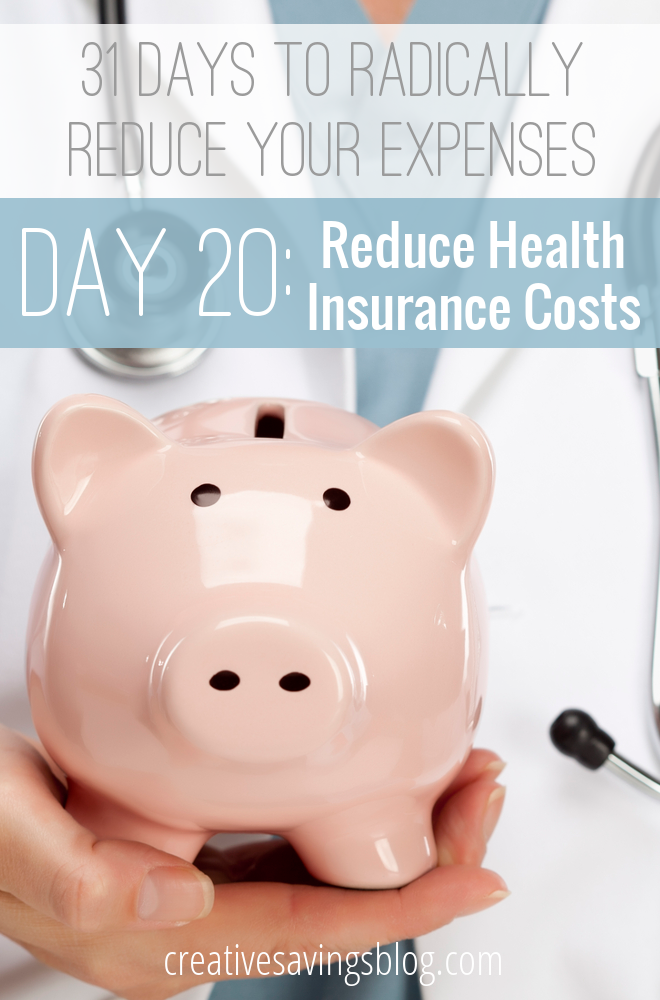Day 20: Reduce Health Insurance Costs
This post may contain affiliate links. Read my full disclosure policy here.
This post is part of the 31 Days to Radically Reduce Your Expenses series. Visit this page for even more ways to slash costs and eliminate unnecessary spending!

Healthcare is often seen as a privilege, and though I don’t want to get into too much of the political controversy here, I think we can all agree there really should be affordable options for everyone, whether it’s through the government or a private company. Any little bit helps, right?
If you’re ready to make a change in health insurance costs, here are 5 recommended ways to get the care you need for less, without sacrificing your entire budget.
How to Reduce Health Insurance Costs:
1. Increase Your Deductible – As with homeowners and car insurance policies, the higher the deductible, the lower the premium. If you decided to change up your plan, establish an emergency fund just in case an emergency does happen. You want to make sure you have enough to cover the deductible, even if you might never need to use it.
2. Double Check Your Deductibles – Just this past week, I was browsing through my prescription plans to see if we had met our deductible yet. Surprisingly, I found we had met more than the deductible, and the insurance company had actually overcharged us for one of our medications. I placed a call right away and was able to get a $72 check in the mail as a reimbursement. Insurance companies are far from perfect, and though I don’t believe the oversight was intentional, it’s still good to double check!
3. Separate and Save – While Joseph’s monthly insurance bill doesn’t cost all that much {because it’s through his job}, it would have more than tripled the cost to add me to the policy. We decided the best course of action would be to put me on an entirely separate plan by myself, and although I’m paying a pretty penny every month, it’s definitely less than if we had doubled up on the same plan. Experiment with a split policy among family members to see if you can score a cheaper rate. It’s certainly worth a shot!
4. Take Advantage of Your FSA – Unfortunately, neither of our health insurance or employer plans offer an Flexible Spending Account, which allows you to set aside tax free dollars for use in prescription payments or copays. I was so sad to see this go away, as it helped out our budget so much! Check with your employer to see if they offer a plan like this, or something else fairly comparable. I would do just about anything to get rid of an extra tax payment!
5. Keep Good Records – One of the main reasons I keep track of my expenses {besides wanting to know exactly what and where I’m spending each month!}, is for tax purposes. You can deduct up to 7.5% of your gross income in medical expenses. That means copays, medications, emergency room visits, and even mileage qualify as a write-off. And if you’re self-employed, don’t forget to deduct your premiums!
6. Participate in Wellness Incentives – Many health plans offer incentives for staying healthy, and will actually reward you for getting yearly checkups, or logging in exercise everyday. When I worked as a bank teller, our health insurance gave us the chance to participate in quarterly challenges, where we could win gift cards or cash just for completing each task. It’s kind of a fun way to save and stay healthy!
7. Find a Different Plan – Part of my commitment to reduce my expenses this month is to really research out different health insurance policies and gather quotes. I’m really tired of paying for ours, and am crossing my fingers that I can find a cheaper plan out there. It might take some time, yes, but if I can save at least $10 a month on my premium, that’s over $100 per year, and I think that’s incredibly worth it!
Today’s Challenge:
There are quite a few options to choose from today, so pick one method to try this week and lower your health insurance premium. I know I’m definitely going to work on #7! Let me know which one you’re trying in the comments below or tweet @KalynBr00ke with #ReduceYourExpenses. Don’t forget to come back with the results!
{Go to Day 21: Save Money on Makeup}
More Must-Reads:
- How We Save Money on Healthcare Costs {MSM}
- How to Save Money on Healthcare Coverage {IATL}
- Ways to Find Affordable Healthcare {SL}
Disclosure: Some of the links in the post above are affiliate links. This means if you click on the link and purchase the item, I will receive an affiliate commission. Regardless, I only recommend products or services I use personally and believe will add value to my readers. Read my full disclosure policy here.



Hi Kalyn. thanks so much for writing this series! I have found a couple of things that are new ideas to me and I’m excited to try. I wanted to comment on a couple things in this post though that we learned from our tax guy this past year. The first is that your comment on the tax deduction is a little different now. It used to be that you could deduct anything OVER 7.5% of your income ( so if you make 100K you’d deduct any expenses AFTER 7500), but that changed last year and it is now anything over 10% of your income- that was not paid with an HSA or FSA pre-tax. We had a very high medical expense year last year and still barely qualified for much of a tax break because of that. The second thing was what he recommended we do to remedy that. If you don’t have a HSA or FSA through work, you can get your own HSA and 100% of what you put in there will be tax deductible. So for us, we have an HSA through Chase Credit Union and the max contribution for the year is $6500, which means that the first $6500 of medical expenses are tax deductible regardless of our income for the year.
You may want to research that a little more, but that’s what we were told by our CPA, so I’m hoping it’s accurate come tax time next year!
You’re welcome, Katie! And thank you so much for your comment. It seems like tax items change ALL the time, and it is good to have a CPA to refer to about this. Really appreciate your insight and will be doing some more research with my own!